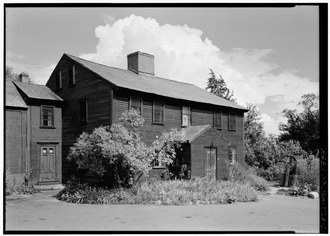Samuel Hartwell House facts for kids
Quick facts for kids Samuel Hartwell House |
|
|---|---|

The house in the 1960s, around ten years before its destruction
|
|
| General information | |
| Location | Lincoln, Massachusetts (Concord until 1754) |
| Address | North County Road |
| Coordinates | 42°27′10″N 71°17′28″W / 42.4527°N 71.2910°W |
| Completed | c. 1694 |
| Destroyed | 1973 (fire) |
| Technical details | |
| Floor count | 3 (including the cellar) |
The Samuel Hartwell House was an important historic site linked to the American Revolutionary War. It played a role in the very first battle of the revolution, the 1775 battles of Lexington and Concord.
Built around 1694, the house was originally in Concord. It was located on North County Road in what is now Lincoln, Massachusetts. This spot was very close to Battle Road, a famous path from the war. The house was also near Hartwell Tavern, which Samuel Hartwell built for his son, Ephraim, in 1733. Today, the area where the house stood is part of the Minute Man National Historic Park.
Sadly, the Samuel Hartwell House was destroyed by fire in 1973. All that remains now is its central chimney.
Contents
History of the Hartwell House
The Samuel Hartwell House was built as a home for Samuel Hartwell (1666–1744) and his first wife, Abigail Stearns. The main front of the house faced south. After Abigail passed away in 1709, Samuel married three more times.
The house was built on land Samuel bought in 1694. Today, only the central chimney of the Samuel Hartwell House still stands. There is also a basic outline of where the building once was.
In 1926, two women, Marion Fitch and Jane Poor, bought the house. Marion was a schoolteacher from Boston, and Jane was an architect. They turned the historic house into a restaurant called Hartwell Farm.
The Hartwell Family Farm
When Samuel Hartwell died in 1744 at age 78, his son Ephraim inherited part of the family farm. By 1749, the farm was very successful. It covered 141 acres and was one of the most productive farms in Concord.
The property was part of Concord until 1754. That year, the town of Lincoln was officially created, and the house became part of Lincoln.
Later, Samuel's grandson, also named Samuel (1742–1829), married Mary Flint in 1769. His father, Ephraim, then gave the house to this younger Samuel. The Hartwell family lived in the house until 1785.
Role in the Revolutionary War
The battles of Lexington and Concord began early in the morning on April 19, 1775. British soldiers marched right past the Samuel Hartwell House on their way to Concord. They passed it again on their way back to Boston.
Three of Ephraim and Elizabeth Hartwell's children were involved in these battles. Samuel, John, and Isaac were all part of the Lincoln minutemen. Minutemen were special colonial militia members who were ready to fight at a moment's notice. These three brothers fought at Old North Bridge and along the battle road. All three later served throughout the entire Revolutionary War.
The Midnight Ride and Warning
On the night of April 18, Paul Revere and William Dawes were on their famous "Midnight Ride" to warn colonists that the British were coming. They were stopped by a British Army patrol near the Hartwell House.
Another rider, Samuel Prescott, was with them. He managed to escape by jumping his horse over a wall and into the woods. Prescott then reached the nearby Hartwell Tavern. He woke up Ephraim Hartwell and told him that British soldiers were on their way.
Ephraim quickly sent his enslaved person, Violet, down the road. Her job was to warn his son Samuel and his family. Mary Hartwell, Samuel's wife, then passed the message to Captain William Smith. Captain Smith was the leader of the Lincoln minutemen. He lived a little to the west, and his home still stands along Battle Road today. Thanks to these warnings, the minutemen received the news in time. They were able to get to Old North Bridge before the British soldiers arrived. Samuel Prescott also made it safely to Concord to deliver his warning.
Remains of the House
Today, visitors can see the remains of the Samuel Hartwell House. While the house itself is gone, its central chimney still stands. There is also a basic outline of the house's foundation.
 | Isaac Myers |
 | D. Hamilton Jackson |
 | A. Philip Randolph |



